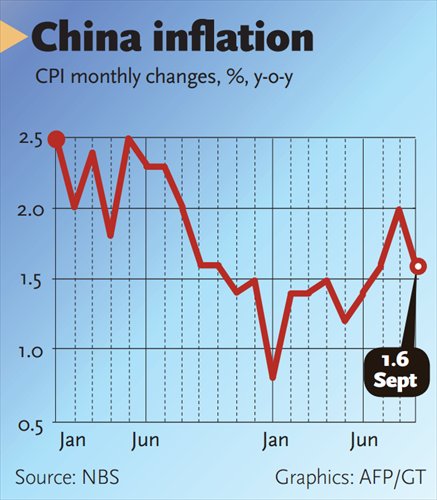
China's consumer inflation eased in September, while producer prices fell for the 43rd straight month, leading to speculation of additional monetary easing to stimulate demand and growth in the country.
The Consumer Price Index (CPI), a main gauge of inflation, rose by 1.6 percent in September compared with last year, down from 2.0 percent for the previous month, the National Bureau of Statistics (NBS) announced on Wednesday. It was also below forecasts of a 1.8 percent rise from a Reuters poll.
According to the NBS, the Producer Price Index (PPI), which measures wholesale prices, fell 5.9 percent in September from the same period last year, the same level as in August. The decline stretched to its 43rd straight month as producers dealing with weak demand cut the prices of their products.
On a monthly basis, the PPI contracted 0.4 percent in September, compared with a 0.8 percent decline in August.
Yu Qiumei, a senior NBS statistician, said on Wednesday that the inflation rate was relatively high in September 2014, and this caused the CPI growth this September to appear weak.
The NBS data showed that food prices in September rose by 2.7 percent compared to the same period last year, down from 3.7 percent in August. Pork prices, a key barometer of inflation, eased from last month's 19.6 percent increase to 17.4 percent in September.
"The pork and vegetable price fluctuation has dragged up August's CPI. As those prices stabilized in September, the inflation rate also eased to a certain extent," Xu Gao, chief economist at China Everbright Securities, told the Global Times on Wednesday.
The increase in fresh vegetable prices slowed from 15.9 percent in August to 10.4 percent in September.
Zhang Liqun, a macroeconomics research fellow at the Development Research Center of the State Council, also told the Global Times that September's CPI shows a generally "stable trend."
September's CPI rose 0.1 percent compared with August.
Zhang said the government should not "lower its guard" and should continue to keep food prices at a stable level.
But Lu Zhengwei, chief economist at Industrial Bank, said that the lower-than-expected September inflation rate "deserves high attention."
"In September, when there are two national holidays, people usually spend more. But a large part of this consumption is done abroad, and this reflects the problem of the yuan's overvalued exchange rate," he was quoted by domestic finance news portal ce.cn as saying on Wednesday.
The inflation rate might rise slightly in the next few months, but the average increase in 2015 is unlikely to exceed 2 percent, according to a report the Bank of Communications sent to the Global Times on Wednesday.
However, Zhang said that the PPI data shows that China still faces industrial inflation pressure, and the country urgently needs an increase in domestic demand.
"The government has rolled out a series of measures to stimulate domestic demand, and it's important that those policies are properly carried out," he noted.
The Bank of Communications report also said that the PPI's negative growth trend is unlikely to change in 2015, but that this situation could prompt domestic industries to hasten their upgrading.
The CPI and PPI figures come on the heels of weak import data released Tuesday, and reveal continued downward pressure on China's economy.
Imports tumbled by 17.7 percent in September compared to the same period last year.
Zhang said that under the current economic situation, the government is likely to implement more fiscal stimulus measures in the fourth quarter.
Xu said that the government might lower the bank's reserve requirement ratio (RRR), the minimum level of reserves banks must hold, in the next few months, but is unlikely to further cut benchmark interest rates because they are already relatively low.
The People's Bank of China, China's central bank, has cut both benchmark interest rates and the RRR four times in 2015.


















































